5 books by Engel, David
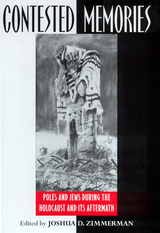
Contested Memories
Poles and Jews during the Holocaust and Its Aftermath
Zimmerman, Joshua D.
Rutgers University Press, 2003
Few issues have divided Poles and Jews more deeply than the Nazi occupation of Poland during the Second World War and the subsequent slaughter of almost ninety percent of Polish Jewry. Many Jewish historians have argued that, during the occupation, Poles at best displayed indifference to the fate of the Jews and at worst were willing accomplices of the Nazis. Many Polish scholars, however, deny any connection between the prewar culture of antisemitism and the wartime situation. They emphasized that Poles were also victims of the Nazis and, for the most part, tried their best to protect the Jews.
This collection of essays, representing three generations of Polish and Jewish scholars, is the first attempt since the fall of Communism to reassess the existing historiography of Polish-Jewish relations just before, during, and after the Second World War. In the spirit of detached scholarly inquiry, these essays fearlessly challenge commonly held views on both sides of the debates. The authors are committed to analyzing issues fairly and to reaching a mutual understanding. Contributors cover six topics:
1. The prewar legacy
2. The deterioration of Polish-Jewish relations during the first years of the war
3. Institutional Polish responses to the Nazi Final Solution
4. Poles and the Polish nation through Jewish eyes
5. The destruction of European Jewry and Polish popular opinion
6. Polish-Jewish relations since 1945
This collection of essays, representing three generations of Polish and Jewish scholars, is the first attempt since the fall of Communism to reassess the existing historiography of Polish-Jewish relations just before, during, and after the Second World War. In the spirit of detached scholarly inquiry, these essays fearlessly challenge commonly held views on both sides of the debates. The authors are committed to analyzing issues fairly and to reaching a mutual understanding. Contributors cover six topics:
1. The prewar legacy
2. The deterioration of Polish-Jewish relations during the first years of the war
3. Institutional Polish responses to the Nazi Final Solution
4. Poles and the Polish nation through Jewish eyes
5. The destruction of European Jewry and Polish popular opinion
6. Polish-Jewish relations since 1945
[more]
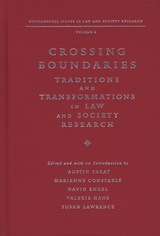
Crossing Boundaries
Traditions and Transformations in Law and Society Research
Austin Sarat
Northwestern University Press, 1998
Perhaps no idea is more emblematic of the field of law and society than crossing boundaries. From the founding of the Law and Society Association in the early 1960s, participating scholars aspired to create a field that crossed boundaries in at least two senses: by undertaking research that questioned and often bridged traditional methodological and disciplinary divisions, and by using nontraditional approaches to explore the interconnections between law and its social context. These essays reflect both aspirations.
[more]
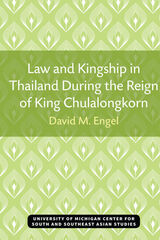
Law and Kingship in Thailand During the Reign of King Chulalongkorn
David M. Engel
University of Michigan Press, 1975
This essay originated in an attempt to bring together the study of law and Thai history in a description of the transformation of Thailand during the late nineteenth and early twentieth centuries as seen from a legal point of view. The resulting work is based for the most part upon those royal enactments from 1873 to 1910 which seemed most crucially to affect the executive, legislative, and judicial functions of the king and the rights of private citizens. [ix]
[more]
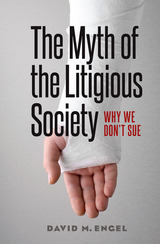
The Myth of the Litigious Society
Why We Don't Sue
David M. Engel
University of Chicago Press, 2016
Why do Americans seem to sue at the slightest provocation? The answer may surprise you: we don’t! For every “Whiplash Charlie” who sees a car accident as a chance to make millions, for every McDonald’s customer to pursue a claim over a too-hot cup of coffee, many more Americans suffer injuries but make no claims against those responsible or their insurance companies. The question is not why Americans sue but why we don’t sue more often, and the answer can be found in how we think about injury and personal responsibility.
With this book, David M. Engel demolishes the myth that America is a litigious society. The sobering reality is that the vast majority of injury victims—more than nine out of ten—rely on their own resources, family and friends, and government programs to cover their losses. When real people experience serious injuries, they don’t respond as rational actors. Trauma and pain disrupt their thoughts, and potential claims are discouraged by negative stereotypes that pervade American television and popular culture. (Think Saul Goodman in Breaking Bad, who keeps a box of neck braces in his office to help clients exaggerate their injuries.) Cultural norms make preventable injuries appear inevitable—or the victim’s fault. We’re taught to accept setbacks stoically and not blame someone else. But this tendency to “lump it” doesn’t just hurt the victims; it hurts us all. As politicians continue to push reforms that miss the real problem, we risk losing these claims as a way to quickly identify unsafe products and practices. Because injuries disproportionately fall on people with fewer resources, the existing framework creates a social underclass whose needs must be met by government programs all citizens shoulder while shielding those who cause the harm.
It’s time for America to have a more responsible, blame-free discussion about injuries and the law. With The Myth of the Litigious Society, Engel takes readers clearly and powerfully through what we really know about injury victims and concludes with recommendations for how we might improve the situation.
With this book, David M. Engel demolishes the myth that America is a litigious society. The sobering reality is that the vast majority of injury victims—more than nine out of ten—rely on their own resources, family and friends, and government programs to cover their losses. When real people experience serious injuries, they don’t respond as rational actors. Trauma and pain disrupt their thoughts, and potential claims are discouraged by negative stereotypes that pervade American television and popular culture. (Think Saul Goodman in Breaking Bad, who keeps a box of neck braces in his office to help clients exaggerate their injuries.) Cultural norms make preventable injuries appear inevitable—or the victim’s fault. We’re taught to accept setbacks stoically and not blame someone else. But this tendency to “lump it” doesn’t just hurt the victims; it hurts us all. As politicians continue to push reforms that miss the real problem, we risk losing these claims as a way to quickly identify unsafe products and practices. Because injuries disproportionately fall on people with fewer resources, the existing framework creates a social underclass whose needs must be met by government programs all citizens shoulder while shielding those who cause the harm.
It’s time for America to have a more responsible, blame-free discussion about injuries and the law. With The Myth of the Litigious Society, Engel takes readers clearly and powerfully through what we really know about injury victims and concludes with recommendations for how we might improve the situation.
[more]
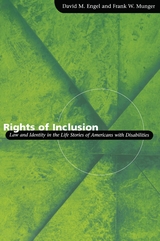
Rights of Inclusion
Law and Identity in the Life Stories of Americans with Disabilities
David M. Engel and Frank W. Munger
University of Chicago Press, 2003
Rights of Inclusion provides an innovative, accessible perspective on how civil rights legislation affects the lives of ordinary Americans. Based on eye-opening and deeply moving interviews with intended beneficiaries of the Americans with Disabilities Act (ADA), David M. Engel and Frank W. Munger argue for a radically new understanding of rights-one that focuses on their role in everyday lives rather than in formal legal claims.
Although all sixty interviewees had experienced discrimination, none had filed a formal protest or lawsuit. Nevertheless, civil rights played a crucial role in their lives. Rights improved their self-image, enhanced their career aspirations, and altered the perceptions and assumptions of their employers and coworkers-in effect producing more inclusive institutional arrangements. Focusing on these long-term life histories, Engel and Munger incisively show how rights and identity affect one another over time and how that interaction ultimately determines the success of laws such as the ADA.
Although all sixty interviewees had experienced discrimination, none had filed a formal protest or lawsuit. Nevertheless, civil rights played a crucial role in their lives. Rights improved their self-image, enhanced their career aspirations, and altered the perceptions and assumptions of their employers and coworkers-in effect producing more inclusive institutional arrangements. Focusing on these long-term life histories, Engel and Munger incisively show how rights and identity affect one another over time and how that interaction ultimately determines the success of laws such as the ADA.
[more]
READERS
Browse our collection.
PUBLISHERS
See BiblioVault's publisher services.
STUDENT SERVICES
Files for college accessibility offices.
UChicago Accessibility Resources
home | accessibility | search | about | contact us
BiblioVault ® 2001 - 2024
The University of Chicago Press









